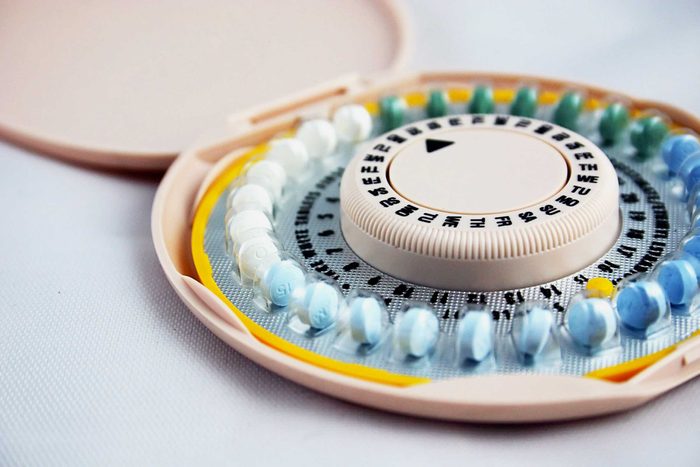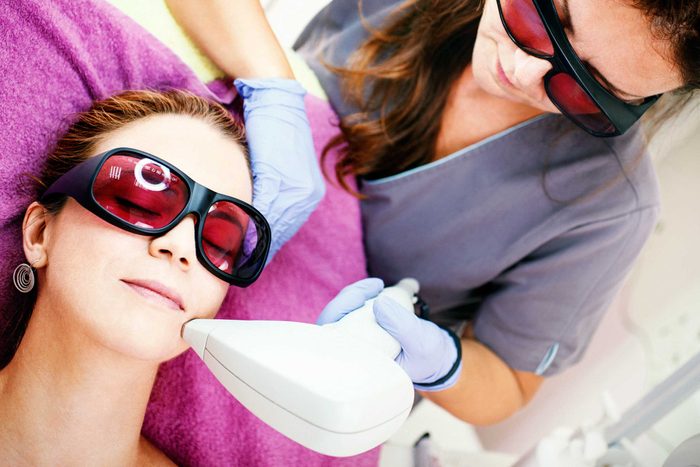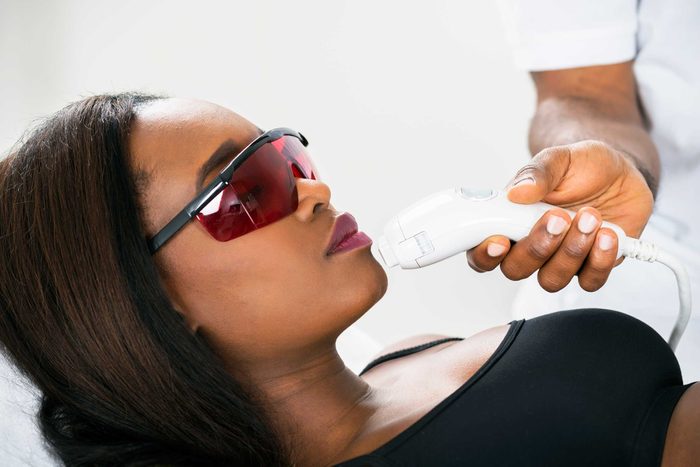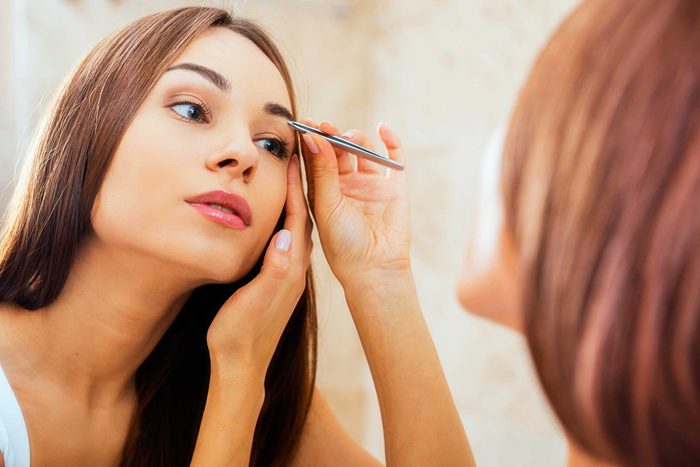
You have a hormone imbalance
Up to 10 percent of women have hirsutism, which is hair growth in a typical male pattern, according to the Mass General Research Institute. This means you can get hair where you don’t want it, like your face, belly, thighs, or butt. According to Mount Sinai Medical Center, about half of cases are caused by high levels of male sex hormones or “androgens,” like testosterone. A frequent culprit is polycystic ovarian syndrome (PCOS). “Women with PCOS usually have excessive growth of facial or body hair because the condition produces excessive amounts of androgens,” says Ghasak Amer Mahmood, MD, an endocrinologist at PIH Health in Whittier, California. So how to get rid of body hair? “This commonly improves with treatment, which includes medications to help regulate the function of the ovaries and reduce the amount of androgens they secrete,” Dr. Mahmood says. The first line of treatment is usually the birth control pill; if that doesn’t work, other anti-androgen medications are available—although you shouldn’t take them if you are trying to get pregnant, as they can cause birth defects. These are the other clear signs you have a hormonal imbalance.

You’re entering menopause
Even if your hormones are normally balanced, it won’t last forever. According to the American Society for Reproductive Medicine (ASRM), when estrogen levels decrease in menopause, androgens that had previously been held in check can cause unwanted side effects, like excess hair. “As many as half of women during menopause experience changes in hair growth, with scalp hair loss and unwanted body hair, especially on the upper lip or chin,” says Clara Ward, MD, an obstetrician-gynecologist and maternal-fetal medicine specialist at McGovern Medical School at UT Health and Children’s Memorial Hermann Hospital in Houston. “Hair growth can be a few hairs or heavy and beard-like, and can be soft like peach fuzz or dark, thick, and wiry.” Estrogen replacement may help women with facial hair during menopause—but discuss with your doctor whether it’s right for you. And if you choose to shave to remove unwanted hair, find out the 10 proven ways to prevent razor burn.

Your adrenal gland is acting up
If you experience a sudden growth of extra hair, see your doctor (an ob-gyn, endocrinologist, or dermatologist) ASAP. Although it’s rare, it may be caused by an adrenal gland disorder. “In Cushing’s syndrome, the major product of the adrenal gland, cortisol, is increased, but along with it, excess androgens are released as well,” says Mazen Abdallah, MD, a reproductive endocrinologist with McGovern Medical School at UT Health and Children’s Memorial Hermann Hospital, and medical director of the Houston Fertility Institute in Texas. “In congenital adrenal hyperplasia, there is a deficiency in one of the enzymes that produce cortisol. As a result, cortisol can’t be produced, and the precursors are diverted to producing androgens instead, leading to excessive hair growth.” Adrenal tumors, which are usually non-cancerous, can also lead to excess androgens. Regulation of these conditions through medication or surgery (in the case of a tumor) should restore hormone levels and reduce hair growth.

You’ve gained weight
Another cause of high testosterone that leads to unwanted hair growth is extra weight. “Obesity alters the way that the body produces and processes hormones,” Dr. Ward explains. “When insulin levels in the body are high they stimulate the production of male hormones.” Obesity is also linked with PCOS and diabetes, a condition that also affects insulin levels. But the good news is that lifestyle changes can help get you back on track. “Weight loss can help lower the amount of male hormones, which can decrease hair growth and improve sugar control and fertility,” she says. To lessen the effects of hirsutism, the Penn State Medical Center suggests a diet low in refined sugar and trans fat, and rich in antioxidant foods like fruits and vegetables, lean meats, and healthy oils.

You have sensitive hair follicles
If your doctor has ruled out hormone irregularities and adrenal problems, you may simply have sensitive hair follicles. “The androgen receptors in the hair follicles can be super sensitive to any normal androgen circulating in the blood,” says Sandy S. Tsao, MD, a dermatologist at Massachusetts General Hospital in Boston. So even though your testosterone levels may be normal, your hair follicles overreact to it. In this case, getting rid of body hair means removing it through temporary means like shaving, waxing, threading, or depilatories—or you can try permanent methods like laser hair removal or electrolysis. Dr. Tsao says electrolysis targets each individual follicle, so it can be very tedious; laser hair removal doesn’t work on blonde or gray hair (and coloring it dark won’t work because it targets the follicle under the scalp). Talk to a dermatologist skilled in hair removal to figure out which option is best for you.

You’re pregnant
Like other normal hormonal changes in a woman’s life, pregnancy can cause unwanted hairs to spring up. “During pregnancy, the extra hormones can cause hair to grow thicker, faster, and darker,” says Dr. Ward. “This occurs not just on the scalp, but on the body as well, which is usually covered with fine hairs that now appear more prominent. The belly is a common location, as are the face, breast, and thighs.” Although there’s an old wives’ tale that a hairy belly during pregnancy means it’s a boy, the hormones really don’t have anything to do with the sex of the baby—it’s just one of those weird pregnancy symptoms no one tells you about! The American Pregnancy Association says most hair removal methods haven’t been confirmed as safe for pregnancy, so shaving may be your best option. Or just wait until the baby is born, since after pregnancy your hair should return to normal. Find out the 9 skin and hair changes that occur during pregnancy.

You take certain medications
If you take steroids, like prednisone, or danazol, which treats endometriosis, you may be in for some hairy side effects. “These medications are derived from androgens,” Dr. Abdallah says. “Other medications, like Rogaine (minoxidil), which is used to stop or slow hair loss, may promote hair growth in unwanted areas in the body.” Dr. Tsao says cyclosporine, a drug for immune disorders, and some anti-seizure meds can also cause excess hair. Once you stop taking the meds the hair growth will stop, but while you are still on them you will need to use other methods to remove it.

You have thyroid issues
Thyroid problems are commonly associated with hair loss, but Dr. Abdallah says it can go the other way too. “Thyroid disease can cause excessive hair growth, but it usually does not fit the typical male pattern associated with androgen excess,” he says. In other words, women may end up growing thicker hair in places that are not normal for men or women. But, Dr. Abdallah says that thyroid dysfunction can sometimes also coincide with other hormone issues, like elevated prolactin levels. Your doctor will do a full workup to see where the issues lie, and once they’re treated, the hair should stop growing.

It runs in your family
Unfortunately, some ethnic groups are simply hairier than others. “It’s quite common for Mediterranean or darker-skinned individuals to have excessive hair, particularly in the upper lip and jawline areas,” says Dr. Tsao. So what can you do? You can’t change your genetics, so you’ll have to rely on removing the hair by either temporary or permanent means. One caution for women with darker skin, though: “The target for laser hair removal is melanin, so it will be absorbed by your dark hair—but also by the melanin of the skin,” Dr. Tsao says. “So it could lead to loss of skin pigmentation.” To avoid the unhappy side effect of white patches on your face or body, make sure to see a doctor with experience in laser hair removal for people of all ethnicities. These are the 14 things you need to know before you get laser hair removal.

Over-tweezing
You know the old wives’ tale that if you shave, the hair will grow back coarser and thicker? Well, that’s not exactly true. Dr. Tsao says shaving doesn’t affect the underlying follicle because it only cuts off the hair that’s above the skin. But, if you pull the hair out from the follicle, like with tweezing or waxing, it can actually grow back heavier. “When we’re using these temporary hair methods, we also stimulating the hair,” she says. “You’re creating an injury to the hair, and its response is to become a little bit thicker.” If this is an issue for you, a prescription cream called Vaniqa can slow the rate of hair growth so that you can go longer in between tweezing sessions. Paying attention to your hair growth can give you a window on your overall health. Here are 8 things your hair can tell you about your health.

